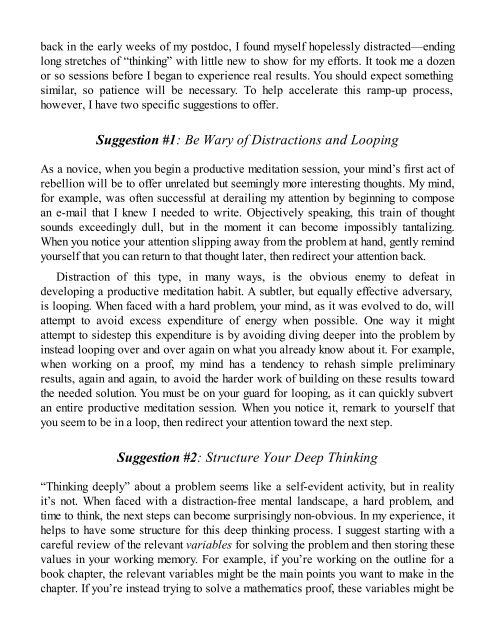Deep Work_ Rules for focused success in a distracted world ( PDFDrive.com )
Create successful ePaper yourself
Turn your PDF publications into a flip-book with our unique Google optimized e-Paper software.
ack <strong>in</strong> the early weeks of my postdoc, I found myself hopelessly <strong>distracted</strong>—end<strong>in</strong>g<br />
long stretches of “th<strong>in</strong>k<strong>in</strong>g” with little new to show <strong>for</strong> my ef<strong>for</strong>ts. It took me a dozen<br />
or so sessions be<strong>for</strong>e I began to experience real results. You should expect someth<strong>in</strong>g<br />
similar, so patience will be necessary. To help accelerate this ramp-up process,<br />
however, I have two specific suggestions to offer.<br />
Suggestion #1: Be Wary of Distractions and Loop<strong>in</strong>g<br />
As a novice, when you beg<strong>in</strong> a productive meditation session, your m<strong>in</strong>d’s first act of<br />
rebellion will be to offer unrelated but seem<strong>in</strong>gly more <strong>in</strong>terest<strong>in</strong>g thoughts. My m<strong>in</strong>d,<br />
<strong>for</strong> example, was often <strong>success</strong>ful at derail<strong>in</strong>g my attention by beg<strong>in</strong>n<strong>in</strong>g to <strong>com</strong>pose<br />
an e-mail that I knew I needed to write. Objectively speak<strong>in</strong>g, this tra<strong>in</strong> of thought<br />
sounds exceed<strong>in</strong>gly dull, but <strong>in</strong> the moment it can be<strong>com</strong>e impossibly tantaliz<strong>in</strong>g.<br />
When you notice your attention slipp<strong>in</strong>g away from the problem at hand, gently rem<strong>in</strong>d<br />
yourself that you can return to that thought later, then redirect your attention back.<br />
Distraction of this type, <strong>in</strong> many ways, is the obvious enemy to defeat <strong>in</strong><br />
develop<strong>in</strong>g a productive meditation habit. A subtler, but equally effective adversary,<br />
is loop<strong>in</strong>g. When faced with a hard problem, your m<strong>in</strong>d, as it was evolved to do, will<br />
attempt to avoid excess expenditure of energy when possible. One way it might<br />
attempt to sidestep this expenditure is by avoid<strong>in</strong>g div<strong>in</strong>g deeper <strong>in</strong>to the problem by<br />
<strong>in</strong>stead loop<strong>in</strong>g over and over aga<strong>in</strong> on what you already know about it. For example,<br />
when work<strong>in</strong>g on a proof, my m<strong>in</strong>d has a tendency to rehash simple prelim<strong>in</strong>ary<br />
results, aga<strong>in</strong> and aga<strong>in</strong>, to avoid the harder work of build<strong>in</strong>g on these results toward<br />
the needed solution. You must be on your guard <strong>for</strong> loop<strong>in</strong>g, as it can quickly subvert<br />
an entire productive meditation session. When you notice it, remark to yourself that<br />
you seem to be <strong>in</strong> a loop, then redirect your attention toward the next step.<br />
Suggestion #2: Structure Your <strong>Deep</strong> Th<strong>in</strong>k<strong>in</strong>g<br />
“Th<strong>in</strong>k<strong>in</strong>g deeply” about a problem seems like a self-evident activity, but <strong>in</strong> reality<br />
it’s not. When faced with a distraction-free mental landscape, a hard problem, and<br />
time to th<strong>in</strong>k, the next steps can be<strong>com</strong>e surpris<strong>in</strong>gly non-obvious. In my experience, it<br />
helps to have some structure <strong>for</strong> this deep th<strong>in</strong>k<strong>in</strong>g process. I suggest start<strong>in</strong>g with a<br />
careful review of the relevant variables <strong>for</strong> solv<strong>in</strong>g the problem and then stor<strong>in</strong>g these<br />
values <strong>in</strong> your work<strong>in</strong>g memory. For example, if you’re work<strong>in</strong>g on the outl<strong>in</strong>e <strong>for</strong> a<br />
book chapter, the relevant variables might be the ma<strong>in</strong> po<strong>in</strong>ts you want to make <strong>in</strong> the<br />
chapter. If you’re <strong>in</strong>stead try<strong>in</strong>g to solve a mathematics proof, these variables might be



